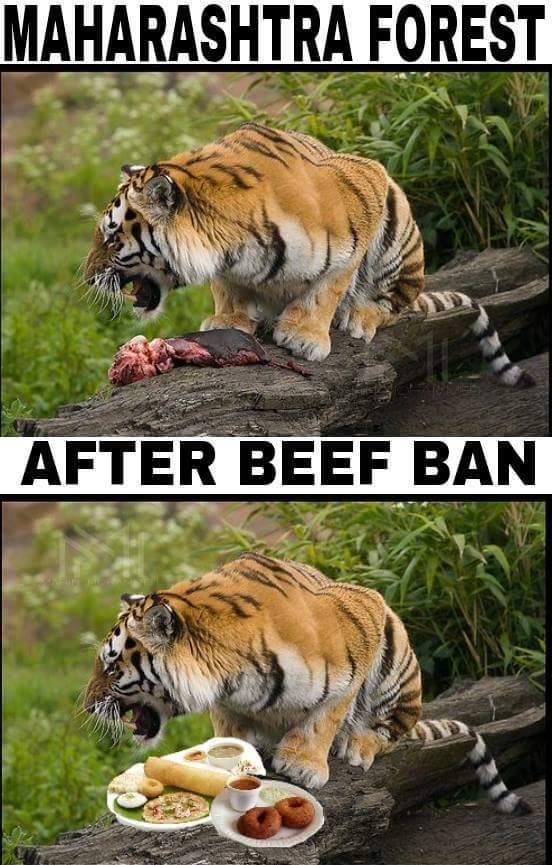Guess what? India wants to become a “#superpower“. LOL. No #offence, but it is vociferously vile to behold that Indians require “state” to do that; when their very obeisance to the organic foundation is antithetical to natural rights. On one side, I am seeing some self-enlightened “urban” Indians wanting “free speech” and on the other hand, these proponents “need government to build roads“. I also see people with “open mouth than open mind” AND people with “education, but without common-sense”. Coming to the point, India is becoming a pioneer in “censoring” AND “banning” things. From beef to documentaries, pornography to bikinis, the Government of India and their voters deserve a “mild” clap for banning [everything] to ‘save’ India from the “immoralism”.
Muneeza Naqvi reports that over the last year, at least two books and two films have become off-limits in India. “The Satanic Verses” has been forbidden since the 1990s. And the film censor board has issued a list of unacceptable words. India is the world’s largest “democracy” where 51% decide what 49% should be doing. And yet, as its official and unofficial bans show, this country of 1.2 billion continues to grapple with a complex tangle of deep sensitivities and a political process that is deeply influenced by religious and caste loyalties. “Religious communities, ethnic groups, historical figures are all off-limits,” says Shiv Vishvanathan, a social scientist at O.P. Jindal Global University. “India’s ban epidemic” took place last week when the government halted the screening of “India’s Daughter,” a British documentary on a 2012 gang rape, an attack so brutal that it sent shock waves through this nation long inured to violence against women. The reasons for banning the film were never spelled out, but officials seemed to suggest a range of possibilities — from fears that the film denigrated India to anger that it aired an interview with one of the convicted and condemned attackers.
Santosh Desai, a social commentator and newspaper columnist, said that instead of tackling serious issues such as sexual violence, the government often turns ostrich-like, banning attempts to provoke discussion. “Women’s safety is a complex problem and banning a film that draws attention to it gives the illusion of action,” Desai said. Bans are also a result of the fact that politics in this massive, chaotic country is still largely focused on identity — religious or ethnic.
Indian intellectuals reacted with outrage and condemnation in the aftermath of the jihadist attacks on the French satirical magazine Charlie Hebdo, but few show support when books and artists are banned in India, largely because they know the state often won’t step in to protect them. India-born writer Salman Rushdie’s book “The Satanic Verses” has been banned here since 1998, since many Muslims consider it blasphemous. Rushdie was forced to cancel a 2012 appearance at the Jaipur Literary Festival amid protests and threats by prominent Muslim clerics. Last year, the publishing house Penguin India pulled from shelves and destroyed all copies of American historian Wendy Doniger’s “The Hindus: An Alternative History,” after protests and a lawsuit from a Hindu right-wing group. The group’s main objection was that the book described Hindu mythological texts as fictional.
And in January, Tamil writer Perumal Murugan was hounded from his home in southern India after right-wing Hindu groups and local caste groups called for his death and burned copies of his book “One Part Woman,” saying it offended members of the Gounder caste. In response, the writer posted on his Facebook page that “Perumal Murugan, the writer is dead. As he is no God, he is not going to resurrect himself.” He urged his publishers to stop selling his work, and his readers to burn copies of his books. Vishvanathan said no one stood up to defend Murugan: “Our institutions don’t have any teeth and our intellectuals don’t stick to their guns.”Movies are another common target. India’s film censor board rejected the erotic drama “Fifty Shades of Grey,” (Read: Fifty shades of Government) and Hollywood movies that do appear on Indian screens are routinely scrubbed of sex scenes. Religious content also can draw censorship: “The Da Vinci Code” was banned in the Indian state of Goa, which has a large Christian population, because religious groups objected.
The censor board recently issued a list of words it considered too racy – mostly expletives but also “masturbation” and any “double meaning words” in any language. The list is currently on hold, but the board did mute the word “lesbian” in a Bollywood film released last week. The Internet is no safe haven, as a comedy group’s roast of several well-known movie stars recently showed. The roast was equal parts crass, vulgar and hilarious. None of the stars seemed offended, but the language offended several religious and political groups. Within weeks of the Jan. 20 roast, the group had been forced to pull the video off YouTube and all participants, including the movie stars, had been served legal notices for offenses ranging from using vulgarity in front of women to circulation of obscene content on the Internet. It’s unlikely anyone will actually serve jail time, but it’s added a layer of caution in a society where there’s already a great deal of self-censorship.
Bans can even extend to food. A newly elected Hindu right-wing government in Maharashtra state recently made all slaughter, sale and consumption of beef a criminal offense punishable with a five-year prison sentence.
While Maharashtra’s ban is one of the most stringent, similar bans are in place in several Indian states because the cow is revered in Hinduism.
Bhuvan Bam tells us why India should be renamed as Ban-chod. Check this YouTube video, here: https://www.youtube.com/watch?v=qjq4_3AQcZo
Suggested readings:




